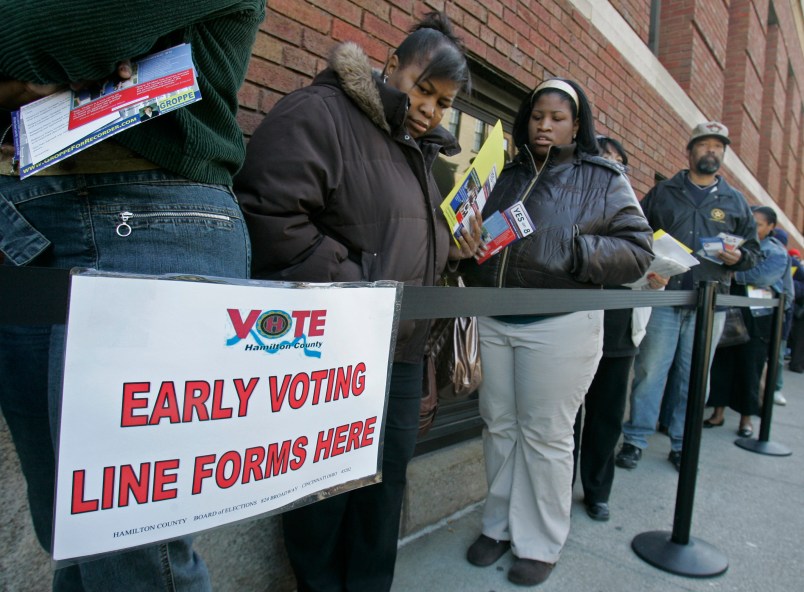Let me start by getting a few important points out of the way, so it is clear what I’m saying.
Yes, Republican legislatures have passed a series of laws making it harder to register and vote. It is not just voter id laws, but laws affecting how ballots are counted, when voting takes place, and what rules are used for resolving disputes. They have done this for partisan (or in some circumstances perhaps a mix of partisan and racial) reasons, and not to prevent fraud, promote public confidence, or further government efficiency. (I make this claim most fully in my 2012 book, The Voting Wars, but it is one of the top topics on this blog.)
Yes, the conservative Supreme Court made it easier for Republican legislatures to pass these laws by gutting a key part of the Voting Rights Act in the 2013 Shelby County v. Holder case and by giving the green light to restrictive voter id laws in the 2008 case, Crawford v. Marion County Elections Board. (And, thanks in part to the irresponsible decision of Justice Ginsburg not to retire early in Obama’s second term and the Democrats’ losses in the 2016 election, the moment for a new progressive Supreme Court has passed and we are likely to see an even more conservative Supreme Court which will give these Republicans the green light to pass ever restrictive voting rules.)
Yes, as Ari Berman has argued, the story of these suppressive efforts have been underreported by the popular press. There were some excellent reporters on this beat this year (including Ari, Pam Fessler, Michael Wines, Sari Horwitz, Tierney Sneed, and Zack Roth), but it did not get reported enough, especially on television (Rachel Maddow and Joy Reid discussed it, but it was barely a blip elsewhere).
BUT….
There is thus far not enough evidence (as I’ve shown in this post) that these laws actually affected the outcome of the presidential election. We have statistics on a fewer number of polls open or early voting days in some of these states, and we know courts have found in some cases that up to hundreds of thousands of voters lacked the right kind of ID to vote in some strict voter id states. But it is a big empirical leap to claim that these cutbacks caused the losses for Democrats in states that mattered for the outcome of the electoral college. Lots of people who lacked id could have gotten it and voted. (A more plausible case could be made in some of these states that these laws mattered in races which are very, very close.)
More importantly, even in states that had eased their voting and registration rules in recent years, such as Minnesota, Democratic turnout was way down. This is key: Hilllary Clinton is down millions of Democrats’ votes (right now about 7 million votes) compared to Obama in 2012. People stayed home for reasons unrelated to voter suppression.
From Philip Bump:
In Michigan, Clinton got 13 percent fewer votes than Obama. Trump got 7 percent more than Romney.
In Pennsylvania, Clinton got 5 percent fewer votes than Obama. Trump got 9 percent more than Romney.
In Wisconsin, Clinton got 15 percent fewer votes than Obama. Trump did slightly worse than Romney — in a state that was home to Romney’s running mate.
Of these states, only Wisconsin had stricter voting laws this election.
So there’s something going on here besides changes in voting rules. Now some can blame the Comey email motivating Republicans to “return home,” Russian/wikileaks stolen Podesta emails, the treatment of Sanders’ voters by Clinton, or Clinton’s ties to big donors and lack of a plan to reach out to rural white voters or give a message that would have resonated more with the Democratic base. It is an important debate to have, and I don’t have answers to what the main problems are. But this is the debate that needs to be had.
Democrats now face two structural disadvantages in running for president going forward. First, they need to overcome the electoral college, which helps Republicans (thanks to smaller states leaning red). Once again, we will have a Democratic candidate getting more popular votes than the Republican. I suspect we would see the same results (but we don’t know) if both candidates ran for the popular vote. Second, going forward we can expect more laws making it harder to register and vote in battleground states controlled by Republicans, and a Supreme Court likely to continue to give the green light.
That makes things tougher. But there’s something more fundamental at play here. Blaming voter suppression in this election will be just as effective as the increasing calls on social media for Republican electors to not vote for Donald Trump when the electoral college votes. It’s not going to help, and ignores the larger problems facing the party and the nation that the party, and those on the left, need to face.






